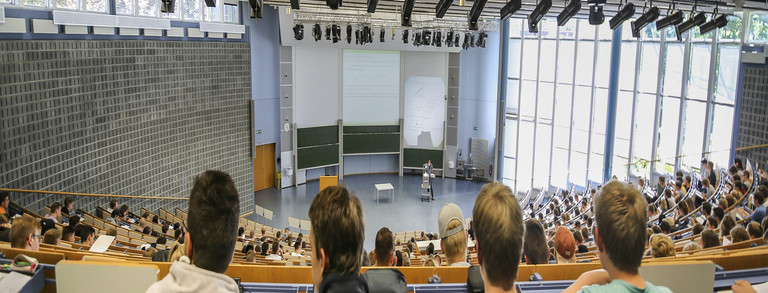Electrical Engineering and Information Technology
Summary
| Degree | Master of Science (M.Sc.) |
|---|---|
| Subject group | Engineering Sciences |
| Standard program duration | 4 semesters |
| Admission requirements |
none
|
| Start of studies |
Winter semester
Summer semester |
| Language | German |
| Enrollment requirements | |
| Further information | Website of Department of Electrical Engineering and Information Technology |
Overview
In the Master’s degree program in Electrical Engineering and Information Technology at TU Dortmund University, students can expect very good teaching, well equipped modern laboratories, and application-oriented research: According to a 2018 university ranking by Wirtschaftswoche, this department with its course offerings places among the Top 10 in Germany. Through its research, the department is active today in shaping the future in areas such as Industry 4.0, cyber-physical systems, and the energy transition. The department achieves the high quality and impact of its research through the powerful networking of competences from science and industry on both national and international levels. Research activities flow directly into the courses. The contents of the study modules can be put together in a highly individual manner, enabling students to develop their own strengths and, in the process, sharpen their profiles in one of four focus areas:
- Electrical Energy Technology
- Microsystems Technology and Microelectronics
- Information Technology and Communications Technology
- Robotics and Automotive Engineering.
In the first semester, the foundations are laid in the areas of model formation and simulation through individually selected basic modules and the required compulsory elective internship. In the second and third semesters, compulsory elective modules can be chosen in the main focus area. With the project group, a comprehensive scientific-technical problem is tackled collaboratively within a specified period of time. A Master’s thesis based on the elective subjects is written during the fourth semester. Thanks to the flexibility of the Master's program in Electrical Engineering and Information Technology, it is possible to plan a stay abroad into the course of study at any time.
Skills and knowledge
Prerequisite for enrollment is completion of a relevant Bachelor’s degree program (Electrical Engineering, for example) with a grade of at least 3.5. According to the examination regulations (§3), comparability of degrees obtained at other universities is generally granted if the degree program has the following subject-related content:
a) a practical study component of at least 10 ECTS credits, as well as
b) at least 25 ECTS credits from the field of mathematics, as well as
c) at least 60 ECTS credits from the field of electrical engineering and
d) at least 10 ECTS credits from the field of computer science and
e) at least 15 ECTS credits from a specialization in electrical engineering and information technology, such as for example electrical energy technology, microelectronics, mechatronics, automation, automotive engineering, communications engineering, or a similar field.
Field of activity
The application areas open to electrical engineers are diverse and depend in part on the focus chosen during the course of studies. Yet all of the specialist areas have one thing in common: The demand for engineers in electrical, electronics, and information technologies is greater today than ever before. Potential career fields include the automobile industry, energy service providers, automation technology, robotics, and telecommunications.
Comprehensive and up-to-date specialist knowledge, skills, and methods, flexible course options, practical components such as the project group, and a very good supervisory relationship during the study program equip our graduates for the responsible implementation of engineering activities in industry and business. In addition, they are well prepared to pursue further academic qualifications, for example a doctoral degree.




![[Translate to English:] Partner Four hands are holding the green logo of TU Dortmund University](/storages/tu_website/_processed_/1/d/csm_Partner_Nicole_Rechmann_KW_40b35bb3fd.jpg)




![[Translate to English:] Forschung An apparatus with tubes in a laboratory](/storages/tu_website/_processed_/0/c/csm_Forschung_Juergen_Huhn_cbd34afd6d.jpg)
![[Translate to English:] Studium Five students are sitting in a lecture hall. They are talking to each other.](/storages/tu_website/_processed_/c/9/csm_Studium_FelixSchmale_81d94adc86.jpg)





